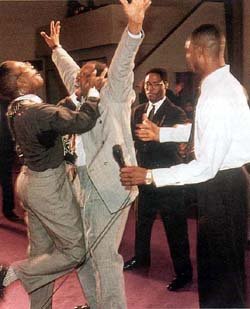My Friends are Famous
ClayNation Dixieland Delight College Football Tour: UT at South Carolina
What an avenue to share the everlasting, life-changing message of Jesus Christ! My focus on this website will be to share with the world my views on the theological, cultural, and moral issues of the day. My primary goal is for others to come to the revelation and knowledge that Jesus Christ is Lord.


Just when I thought that my week was overloaded with church work, God showed me that He is in control and offered an opportunity that will encourage any man called by God. My church work is done out of my home office—but today I stopped by the church and the phone went “Ring, Ring:” the voice on the other end of the line wanted to talk with a young pastor…and he wanted to meet in person.
The voice on the other line said, 'Before we meet, I want to let you know that I am 24 years old and just came to
Wow!!! Someone from the big city of
Rob hadn’t shaved in a few days and probably hadn’t eaten in more.
'So tell me what’s up Rob,' I questioned.
'My girlfriend and I broke up,' He said. 'I went to college here so I caught a bus down from
Silence. I’m shocked and so is the deacon.
I asked some more questions, explained the Gospel to Rob, and told him my story. I told him how Christ changed my life and how Jesus Christ is my personal Lord and Savior.
'I want that,' he said. 'Tell me how to have Jesus as my personal Lord and Savior.'
Right there in the food court at the mall in
I got him some food, we talked for a long time, and I took him to the bookstore.
'I want you to have your own Bible,' I told him.
“Well, all I have is what I am wearing and this book-bag. No Money.”
“I’m buying,' I said.
'Wow, thanks. Then get the cheapest one.'
Rob then spoke words that I wish most people in SBC churches could say: 'Andrew, you told me how the blind-man was changed by Christ, how people noticed, and how he then told them about Christ. That happened to you. Now I have been changed by Christ. I want my mom to see. Jesus is the first step in repairing our relationship. Will you take me to the bus station? I need to go to
That was the best money I have spent in a while and the happiest I have been after accomplishing no 'church work' on a day that I had more to do than time to do it.
Rob will call me again and I will encourage him and offer him discipleship. And the next time my week is in overload with 'church work' I will remember Rob…and remember that God has called me to spread the Gospel and make disciples."




• Enlarge Your Vision
• Develop a Healthy Self Image
• Discover the Power of your Thoughts and Words
• Let Go of the Past
• Find Strength Through Adversity
• Live To Give
And • Choose to Be Happy
Each new plateau represents a challenge and a chance to open up and experience these steps first hand as you learn to live Your Best Life Now."Later, Kant’s followers stated that if we cannot know whether or not our ideas correspond to reality, then all truth must be relative to the individual way our minds interpret reality. Hence, the modern view of truth called relativism (all truth is relative) in due time gave rise to pluralism (all views are true).
Kant's fundamental flaw is his claim to have knowledge of what is unknowable. If it were true that reality cannot be known, no one, including Kant, would know it. If knowledge about reality is impossible for everyone, then it must be impossible for Kant. If reality were actually unknowable, how would Kant know this was true?


God – He does not exist; only the universe exists
Universe – It is eternal; or it randomly came to be
Origin of Humanity – We have evolved, are made of molecules, and are not immortal
Destiny of Humanity – We have no eternal destiny and will be annihilated
Origin of Evil – It is real, caused by human ignorance
Destiny of Evil – It can be defeated by man through education
Basis of Ethics – They are created by, and grounded in, humanity
Nature of Ethics – They are relative, determined by situation
Pantheism:
"The belief that God is the universe...For a panthiest there is no creator beyond the universe; creator and creation are two different ways of viewing the same reality, and ultimately only one reality exists, not many different ones. God pervades all things and is found within all things. Nothing exists apart from God: God is the world and the world is God; God is the universe and the universe is God. People hold to different kinds of pantheism, which are respresented by certain forms of Hinduism, Zen Buddhism, and the New Age. Their views differe as to how God and the world are identified, but they all believe that God and the world are one. Some of the main tenets are as follows:
God – He is one, infinite, usually impersonal; he is the universe
Universe – it is an illusion, a manifestation of God, who alone is real
Origin of Humanity – The human’s true self is God.
Destiny of Humanity – Our destiny is determined by karma/cycles of life.
Origin of Evil – It is illusion, caused by errors of the mind.
Destiny of Evil – it will be reabsorbed by God
Basis of Ethics – They are grounded in lower manifestations of God.
Nature of Ethics – They are relative, transcending the illusion of good and evil.
Theism:
"The worldview that holds to the belief that the world is more than just they physical universe (atheism). At the same time, theists do not accept that idea that God is the world (pantheism). They believe in the existence of God and see His existence as the essential component of the theistic worldview. Thesists are convinced that the universe had a supernatural First Cause who is indefinitely powerful and intelligent. This God is a personal God, separate from the world, who created the universe and sustains it. Thesists believe that God can act within the universe in a supernatural way. The traditional religions of Judaism, Islam, and Christianity represent theism. Some of the main tents are as follows:
God – He is one, personal, moral, infinite in all his attributes
Universe – it is finite, created by an infinite God
Origin of Humanity – We are immortal, crated and sustained by God.
Destiny of Humanity – By choice we’ll be either eternally with or separated from God.
Origin of Evil – It is privation or imperfection caused by choice
Destiny of Evil – It will ultimately defeated by God
Basis of Ethics – They are grounded in the nature of God
Nature of Ethics – They are absolute, objective, and prescriptive.
1) According to a literal interpretation of the “days” in the Bible, the earth seems to be how many yeas old:
b) 500,000-750,000
c) 10,000-20,000
3) True or False: We are 100% responsible for our actions and decisions
4) What is one purpose of a miracle:
5) Yes or No: There are such things as false miracles
6) True or False: Prayer does not change the way God acts
7) Effective prayer is made possible by:
a) God the Father
b) Jesus Christ
c) The Holy Spirit
8) True or False: Angels can be in more then one place at a time
9) What is an example of a purpose that the angels serve?


